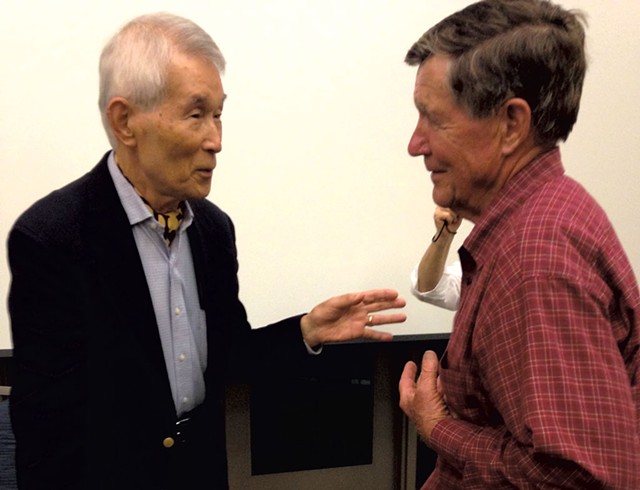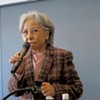
- Ken Picard
- Yasuaki Yamashita and Henry Coe
In September, I previewed "Hibakusha Stories," a University of Vermont event featuring two Japanese atomic bomb survivors — or hibakusha as they are called in Japanese. Shigeko Sasamori, 86, and Yasuaki Yamashita, 79, had been invited to recount their experiences of surviving the nuclear blasts at Hiroshima and Nagasaki, respectively.
After the story was published, I received an unexpected email. Henry Coe of Danville wrote: "I am 78, son of a submarine skipper who lost his life in the Pacific in 1943. I have never held the Japanese people responsible for this. In fact, in order to graduate high school in 1958, I had to write a senior paper and I chose mine with the title, 'Why the U.S. Should Not Have Dropped the Atomic Bomb on Japan.' All my life I felt this was a tragedy for all mankind, initiated by our country. It was not necessary to bring WWII to an end."
Related Japanese Atomic Bomb Survivors Bring Their Stories to Vermont

Coe attended the UVM event, as I did, and he was the first to speak during the Q&A session. Sharing his story, he told the group that he had fully expected to get a failing grade on his paper because of the lingering resentment toward the Japanese people about Pearl Harbor. Instead, his teacher gave him an A.
As a journalist, I like being reminded that even a short, routine story about a public event can have outsize significance for its participants and audience members. Watching Coe and Yamashita speak privately afterward was like witnessing a moment in history: the meeting of two men whose lives were irrevocably altered because, for a brief time, their countries were at war.
As Coe told Sasamori and Yamashita, "I've waited my whole life for this night."











Comments
Comments are closed.
From 2014-2020, Seven Days allowed readers to comment on all stories posted on our website. While we've appreciated the suggestions and insights, right now Seven Days is prioritizing our core mission — producing high-quality, responsible local journalism — over moderating online debates between readers.
To criticize, correct or praise our reporting, please send us a letter to the editor or send us a tip. We’ll check it out and report the results.
Online comments may return when we have better tech tools for managing them. Thanks for reading.